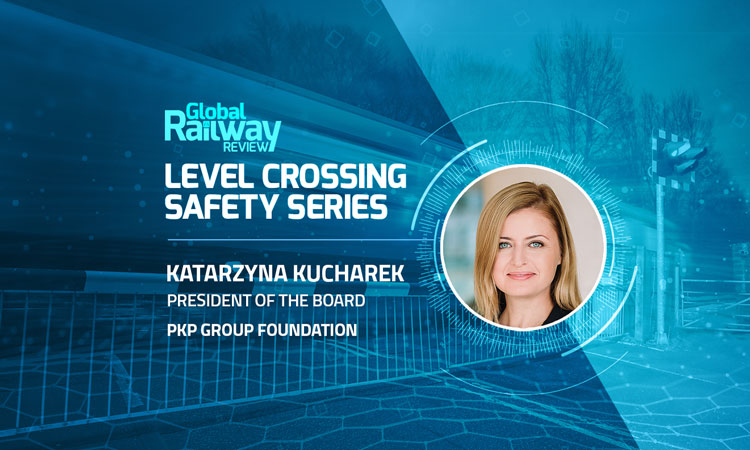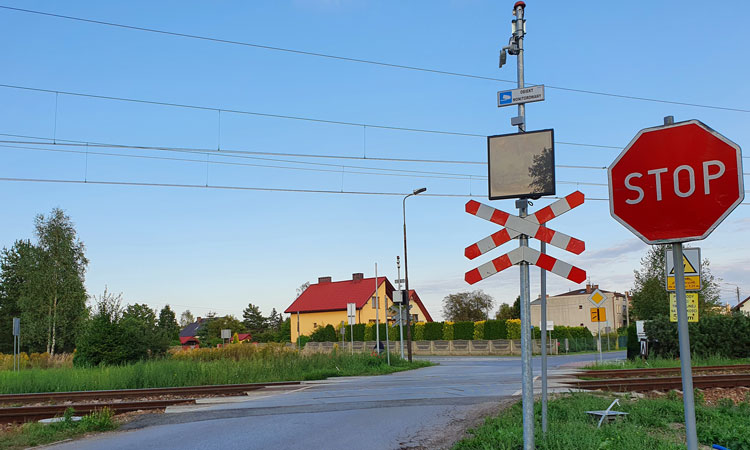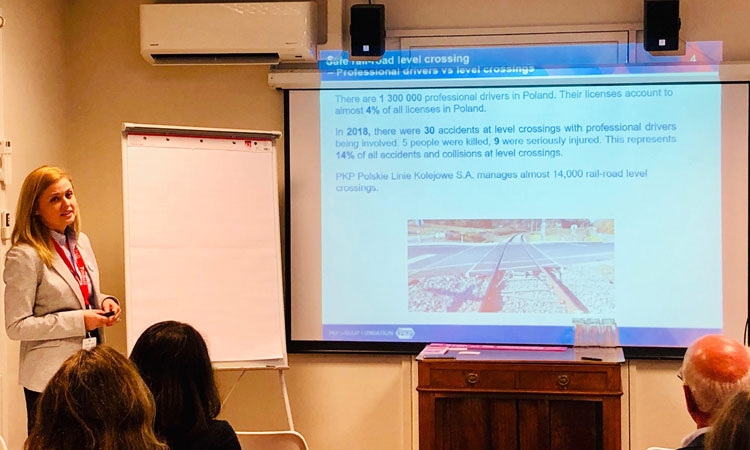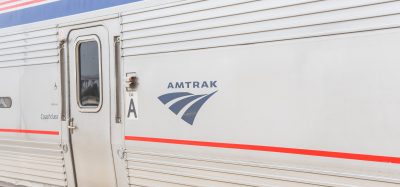Safety at level crossings in Poland: An outline of activities
Posted: 1 June 2021 | Katarzyna Kucharek | No comments yet
Despite an overall reduction in the number of rail-related accidents in Poland in recent years, Katarzyna Kucharek, President of the Board of the PKP Group Foundation, explains that more action needs to be taken to increase safety and minimise risks at level crossings on the country’s rail network.


Ensuring safety at railroad level crossings is important for everyone. To help to minimise the risk of accidents, the cooperation of many entities is necessary. This includes railway and road infrastructure managers, rail market regulators, real estate managers, railway companies and all of us – road and rail users.
According to the data of the Office of Rail Transport in Poland, in 2020, the total number of accidents related to rail transport significantly decreased. Unfortunately, the percentage of accidents at railroad level crossings increased to 170 out of 425 recorded events. This data demonstrates the need to continuously take actions to increase safety and minimise the risk associated with rail transport.
Innovative technology and educational campaigns
The introduction of innovative technology is one of the main pillars of improving safety; however, this needs to be supplemented by raising public awareness through social campaigns. Through our information and educational campaigns, we reach a wide audience – including passengers, drivers and pedestrians – who use level crossing infrastructure on a daily basis.
The campaigns conducted in Poland are very diverse, as they aim to educate and inform individual social groups. They are most often initiated by railway companies and related foundations and associations. The Polish regulator of the railway market – the Railway Transport Office – is also extensively involved in these activities.
Among the many modernisation projects aimed at improving the safety of level crossing infrastructure, one worth noting is the recent initiative of PKP Cargo SERVICE sp. z o.o. Together with 3M, the project involved covering freight wagons with reflective foil tape, which increases their visibility at night and in areas with limited visibility. This reduces the risk of accidents, especially on unguarded level crossings, as drivers of road vehicles have improved visibility of the moving object, which increases their reaction time.
Simple and highly efficient solutions which help to increase security often compliment the use of advanced technologies and information systems. When it comes to the latter, Polskie Koleje Państwowe S.A. is currently working on creating a research and development environment where such solutions can be developed. The aim is to develop product and process innovations that will enable the implementation of accident-free level crossings.


According to the data of the Office of Rail Transport in Poland, in 2020, the total number of accidents related to rail transport significantly decreased. But unfortunately, the percentage of accidents at railroad level crossings increased to 170 out of 425 recorded events.
Alerting road drivers
The vast majority of rail-related incidents take place at level crossings not equipped with security systems. Therefore, the challenge is to introduce technical solutions that will allow drivers and pedestrians to be quickly informed about an approaching train. The President of the Office of Rail Transport chose these types of crossings to begin testing the monitoring systems which will detect vehicles and alert drivers when they are approaching a level crossing. The system also automatically registers non-compliance with traffic regulations – e.g. a driver’s failure to stop at a stop sign. It is also worth noting a system that is currently in development that compliments the one mentioned above and can also be used on guarded crossings. This ‘third signal’, as it is called, is a radio transmitter that enables the transmission of voice and text signals (RDS) in the entire FM frequency range. Thanks to the functionality of modern radios, every driver within a 100m to 300m distance from the level crossing will hear the message about the approaching train – even when using a CD or MP3 player.
These examples are only a sample of the initiatives that are undertaken to improve safety at level crossings. Railway companies – headed by the national infrastructure manager, PKP Polskie Linie Kolejowe S.A. – constantly engage in activities aimed at ensuring the lowest number of possible fatalities.


Katarzyna Kucharek regularly participates in working groups which aim to improve safety at level crossings as part of the International Level Crossing Awareness Day (ILCAD) project.
Communication is key
Technological solutions are widely communicated by the railway industry in public and private media or through social networks. However, the area of communication related to rail and road safety is dominated, not surprisingly, by educational initiatives.
A key educational campaign addressed to children is the ‘ABC Railway Campaign’, which is conducted by the Office of Rail Transport. Together with its protagonist – the Horned Rhino – children learn about appropriate behaviour when using rail transport. This campaign includes advertising spots, games, interactive lessons for pre-schoolers and primary school students, as well as lesson plans or textbooks for teachers. So far, over 17,000 children have participated in lessons, 18 million people have seen the television adverts (over six million viewed in cinemas) and online adverts have had 25 million views. In addition to the PKP Group Foundation, many other carriers joined in for the promotion of the Horned Rhino adverts.
To help to minimise the risk of accidents, the cooperation of many entities is necessary. This includes railway and road infrastructure managers, rail market regulators, real estate managers, railway companies and all of us – road and rail users.
In Poland, extensive information and educational programmes related to safety at level crossings are also carried out by the Foundation of the PKP Group, which was established in 2013 by the Polish State Railways S.A. Since its inception, the organisation supports and inaugurates various initiatives related to railway safety, many of which are aimed at primary school students.
Approximately 5,000 children from nearly 100 schools across Poland participated in the Foundation’s ‘Safety-Friendly School’ project. As part of the innovative campaign (partially sponsored by the Minister of National Education and the Minister of Infrastructure), students were taught railway safety. The project’s mascot, Beni, was also featured in the bilingual teaching publication Beni Teaches Safety: Beni Teaches You to Behave Safely. For the last few years, young readers have been learning about rail safety through the games, puzzles and colouring pages contained in the book.
Involvement in industry events
To reduce the risk of accidents at level crossings, the PKP Group Foundation also participates in many external events. Some of these are large events aimed at a wide audience – such as Moto Safety Day (in Gdynia) – which teaches the principles of partnership and safety to motorised road users. Other events are smaller, more specialist conferences, where experts discuss the latest technology and safety trends in rail transport. Cooperation at these kinds of conferences is an opportunity for the PKP Group Foundation to present global solutions in railway safety.
The PKP Group Foundation – and I, personally – regularly participate in working groups which aim to improve safety at level crossings as part of the International Level Crossing Awareness Day (ILCAD) project implemented by the International Union of Railways (UIC). It is an opportunity to not only learn about the latest trends in global railway safety, but also present the solutions that are used in Poland.
With the future in mind
The activities undertaken to improve safety at level crossings in Poland are very extensive and, therefore, are difficult to fully present in this article. However, it is precisely this multitude and variety of initiatives which makes it possible to believe, with almost certainty, that, in the coming years, we will see a decline in railway accidents.


Stay Connected with Global Railway Review — Subscribe for Free!
Get exclusive access to the latest rail industry insights from Global Railway Review — all tailored to your interests.
✅ Expert-Led Webinars – Gain insights from global industry leaders
✅ Weekly News & Reports – Rail project updates, thought leadership, and exclusive interviews
✅ Partner Innovations – Discover cutting-edge rail technologies
✅ Print/Digital Magazine – Enjoy two in-depth issues per year, packed with expert content
Choose the updates that matter most to you. Sign up now to stay informed, inspired, and connected — all for free!
Thank you for being part of our community. Let’s keep shaping the future of rail together!







